Our Week With Marilyn
Our Week With Marilyn
by Maria Bustillos and David Roth
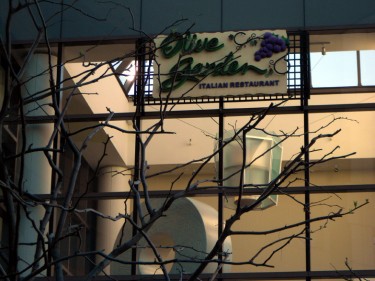
David: So, had your mind blown in a very understated way by any octogenarian restaurant critics lately?
Maria: Yes, and marveled at their sangfroid, also.
David: If we will all remember this past week as the one in which Marilyn Hagerty, elderly journalist in Grand Forks, North Dakota, became famous for a very factual review of a new Olive Garden — and was then punished for it by having to talk to Piers Morgan on CNN, as she will be tonight — it’s still a little unclear how she and we got here. That is, I’m still trying to figure out what The Internet thought about all this. It had some meme-y college-kids-on-automatic-retweet aspects to it, but I can’t tell to what degree people were laughing at this FAIL old lady and her FAIL city, and to what extent there was something else involved. There’s definitely a cornball laughing-at factor to some of it — whoever bothered to break out the goofus Ian McKellen imitation in service of the meme was clearly on the lulz-hunt. But I think there’s more than big city snickering and teenage FAIL-jockeying going on, here. The problem with stuff like this is that, to a certain extent, merely participating in it is a statement. Of some kind.
Maria: The Internet delights in a real-world Onion story, where you really can’t tell for a minute.
David: This is indeed that.
Maria: Like an optical illusion but for your whole concept of society. Then it was discovered that she is cute as a bug, and her photo is so sweet, and it snowballed into A Thing.
David: Also, once you get past the LOL Old Lady thing, the review reveals itself as a miniature masterpiece of Upper Midwest Minimalist Underminining.
Maria: So, I asked Awl columnist Abe Sauer about Marilyn, because he used to live in Grand Forks and has written a book about North Dakota.
Maria: I asked, did you think people were patronizing her? And he said, “Well, I think there’s some genuine ‘how adorable’ stuff going on, but, given the pubs, it’s mostly ‘Ha. What a buncha rubes!’”
Which I took issue with, because I thought it was more like people found her cool matter-of-factness refreshing. It made the likes of Jonathan Gold seem precious and adjective-encrusted and sniffy. And he said, “Ha. Well, she’s been doing that for 40 years. Nobody in Grand Forks knows what Gawker is. That was maybe the best part of living there.”
David: Objectively, Jonathan Gold’s Olive Garden review is many times more mockable and less useful.
David: And she really does throw Gold’s hilarious Food Dude self-regard into sharp relief. Gold would love to spend 45 minutes telling you about the relative succulence of a particular Henan braised beef dish and raving over the bug-intensive setting in which he ate it, and here comes Marilyn on some “the servers wore white shirts and black trousers” shit. There is nothing in her review that can really be argued.
Maria: Well, I could argue with this bit: “It’s fashioned in Tuscan farmhouse style with a welcoming entryway.”
David: I think she meant Tucson ranch house.
Maria: It’s like Tuscan farmhouse by way of Star Trek ca. 1967. Eye-crossing.

Maria: But I’ve got some surprises for you. Because, here are some facts about Marilyn Hagerty. She is very well traveled. (“I have been flitting around this fall. Bismarck. Denver. Atlanta. Rome. Venice,” she wrote in a past column.) She has been a guest at the White House twice. Also, her very accomplished daughter Carol — a lawyer who practiced in Hong Kong and Tokyo, and who was a hunter, and who had three kids — died just this last December of ALS, I was so sorry to see, and she was only 56. Her other children are Gail Hagerty, who is a judge, and James R. “Bob” Hagerty, also a newspaperman: he has worked for the Wall Street Journal and the International Herald Tribune in Hong Kong, London, Brussels, Paris, Atlanta and New York, serving as “managing editor of The Asian Wall Street Journal (1994–98) and London bureau chief of The WSJ (2000–03).”
Jack Hagerty, Marilyn’s husband, died in 1997. He was a veteran of WWII, and he was the editor of the Grand Forks Herald, Marilyn’s paper, for decades. All this charming simplicity that the Internet has been cooing over comes from a highly cultivated person. Just not one with urban habits.
David: Cityfolk, ya burnt. Although of course the majesty of the Internet is that a 15-year-old with a YouTube channel can and will project witheringly over-it superiority to anyone. This can’t change that.
David: I think one reason for all this has been that she was reviewing the Olive Garden, which is a national institution that as far as I can tell everyone hates like crazy. Tell me a bit about the Olive Garden you visited recently. I stopped in at the Times Square one, which it’s safe to say is not like other Olive Gardens, except for the food, which is exactly like that at all other Olive Gardens. Also the Times Square one was hilariously expensive, which I didn’t expect. Yes, it’s New York, but $20.25 for chicken parmigiana is above market even for Manhattan.
Maria: Mine was in Glendale, in the ground floor of some kind of office building. So it doesn’t have a “picturesque” exterior.
Maria: On the same floor there’s also an Islands and a California Pizza Kitchen. You can basically go into cardiac arrest just by parking.
Maria: And this lunch was terrible!! I couldn’t BELIEVE it, nearly forty clams for this lunch, my god, David. With no wine!! I was devastated. I really wanted it to be good. No wonder Marilyn Hagerty confined herself mostly to describing the décor. It was sheer diplomacy.
David: That was my favorite part! Can’t say something nice? Big-up the planters. Weird that these were not special NYC prices I was looking at, then. The last time I was in an Olive Garden was years ago and in Poughkeepsie — not a euphemism for a crappy place but the actual rust-encrusted Poughkeepsie itself — and everything was $13.
Maria: Yes, $13 or so is about the speed in Glendale. We had this thing called I think Venetian Apricot Chicken, and tortelloni with short ribs. That I will never, ever forget. Because here I’d been thinking, well, it can’t be that bad, right?
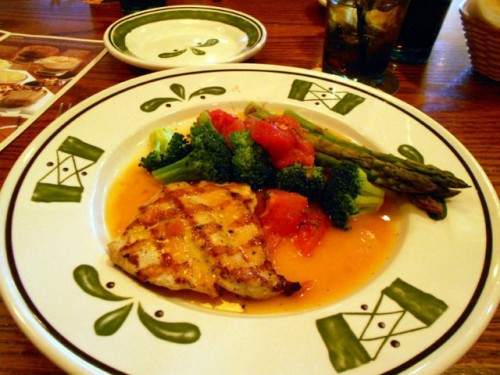
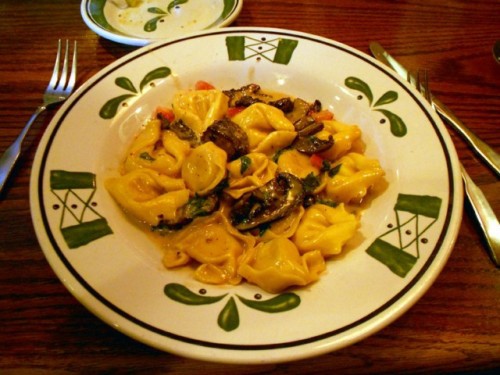
David: The Venetian Apricot Chicken is just a fascinating idea. It sounds like a name for a high-risk sexual practice more than a viable entrée idea. The tortelloni were $28 at the 49th Street place. There was a picture of it on the menu.
Maria: $14 for us. Maybe it’s less at lunchtime. I guess they are harking back to the Italian Renaissance thing of meat with fruit. I’ve seen Northern Italian recipes for, like, rabbit with prunes.
David: Yes, I am certain that’s the harking they had in mind. In the tortelloni picture, it looked like the meat had fallen onto the plate from a great height.
Maria: The tortelloni are immense globs of pasta full of cheese-flavored library paste. In this dreary pinkish-beige fast-congealing tomato cream sauce, like terrible dorm food. But here is the thing. Not a mile away from there is Foxy’s which has huge portions, pretty heavy home cooking, like this. But fresh, delicious and for less money. In more pleasant surroundings. Like, a really pleasant diner.
David: I was going to ask about this — there are better options around, right?
Maria: SO MANY.
David: I’m sure that’s true. But I think the snob-factor is wince-iest for me with regards to her description of the Olive Garden as the largest and most beautiful restaurant in town.
Maria: Abe says that there are good restaurants in Grand Forks, not many. A 100-year-old steakhouse, he says.
Maria: Also this former editor at the Grand Forks Herald told the Duluth News that Hagerty’s regular readers “would know that this is a fairly negative review since she spent a lot more time on the ambience than the food.”
David: Right! She never says it’s the best. Which goes back to what’s best/most avant-garde about the review: ZERO in-text judgment at all. These are factual statements. It is large. It is well lit. Everyone has shirts. The judgment is implied by what’s left out, which are actual words used to describe the food.
Maria: I could wish she’d warned me off it a little more explicitly. Maybe if I was from North Dakota I would know that if the best thing you can say about a dish is that it was “warm,” to take that as a sign.
David: Oh, I think that sort of jiu-jitsu toss works with any accent. Also all of the above is honestly more information than you get out of Jonathan Gold’s review, which is all ambient judgment, a few prissinesses — they “broke” the soup! — and a general sense of “Yikes get me out of here, I’m in fucking Chatsworth and I want to eat dan dan noodles in a basement someplace that you surely do not know about.”
Maria: The “fashion” part of restaurant writing, and restaurant-going, is just dumb, which is why I super wish Olive Garden actually made great, simple, fresh stuff. Because I hate the sniffiness, the fashionableness. M. Hagerty seems totally immune to all that nonsense, of being “too good” for stuff. It doesn’t even cross the transom, for her.
David: That’s the advantage of being an 85-year-old from Grand Forks, ND, at least in this regard. She can eat in an Olive Garden without the tone quotes. What Gold squirms against is less the crappy food than the DREADFUL Olive Garden-ness of it.
Maria: All her stuff is like this, a bit, including her Taco Bell review.
David: “The servers wear sad polo shirts, headsets, and distracted teenage facial expressions. The decor is a total fucking bummer. It’s like you’re inside a bad taco.”
Maria: I liked it better than the Olive Garden one, because she doesn’t feel she has to pull her punches too much. She takes her granddaughter with her. “We tried an order of cinnamon twists. CS liked them. They were certainly crunchy. I could do without them.”
Maria: On the other hand, though. There’s kind of a reverse-patronizing going on, when you’ve got Anthony Bourdain saying this:
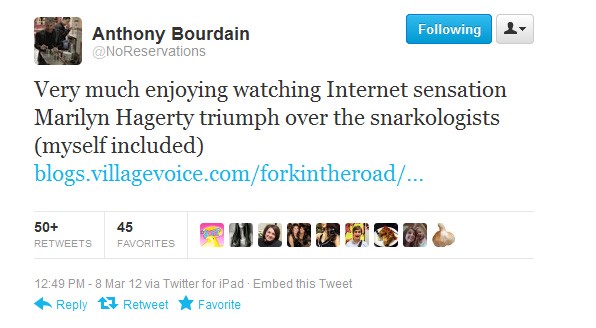
Maria: Because I am entirely pro-snarkology if the goal is to demand better quality for everyone.
David: So, a basic question: did Olive Garden make you mad?
Maria: Yes, very.
David: Because I am lately trying to figure out why garbage food makes me mad.
Maria: Nobody in Glendale, Times Square or Grand Forks should have to pay huge sums to be made to feel like you’ve been dusted inside and out with elderly garlic powder.
I went for a set (if crazy) purpose, but there were all these people in there getting ripped off and poisoned for no reason. Just because TV advertising works? Because it’s familiar and they know what they are going to get and they can bring the kids?
David: I really wonder, although I suspect it’s a lack of competition. And to me, the ads actually make it far less appealing.
Maria: Well they convey, you can come here. Which is not what like, a really fancy place conveys, nor do these Chinese places with no menu that J. Gold goes to. They’re not welcoming or approachable in a come-one, come-all kind of way.
David: But the vibe of those ads all feels crazy to me. Everyone laughing and laughing over things that aren’t even jokes, like they were piping nitrous in through the vents or in a David Lynch dream sequence. “We always get together for lunch in the middle of the day!” And then wild, terrified laughter. Everyone smiling like they’re in the “Black Hole Sun” video. It’s all so welcoming that it makes the whole experience look like joining a manicotti cult or something.
David: And the ads about the cooking academy in Tuscany are especially tough to take. Some Italian stereotype wandering around smelling tomatoes while people in chef’s hats take notes. What’s weirdest to me is that while the familiarity seems the biggest selling point, definitely, the food itself is not familiar really in any way.
David: To a certain extent, Olive Garden is an attempt at replacement-level Italian-American food, which is like a version of actual Italian food that’s based around canned clams and piles of thick sauce on larger piles of wet macaroni. And which can also be great, despite the thick/wet thing from that last sentence.
Maria: We have the same thing with Mexican food here. I LOVE Cal-Mex food and am always defending it with all my might.
David: As well you should. But the Olive Garden is also not that, because your nonna is not trying to order or cook chicken with apricots on it. Nonna is not even trying to hear about that. It would make her curse quietly in some Southern Italian dialect.
Maria: I did have some sympathy with Jonathan Gold saying that he really wanted the food to be good, because I felt exactly the same way, really hoping it would be great.
David: To me, the fact that the food is not good — and it’s a fact, and that’s fine as far as it goes — is less jarring than the actual experience of being at one of these tablecloth-grade macro restaurants. The whole thing is just enough like being in an actual restaurant that the ways in which it deviates from that stand out as especially baffling. The weirdly formalized weirdnesses that we’re supposed to take as normal. The rituals that make regulars feel at home — oh good, I was hoping you’d ask if I needed more breadsticks — but that just make outsiders feel weird.
David: Like, “why is this person all on my ass about the breadsticks? I am fine with the very large amount of breadsticks I already have.”
Maria: “What are you doing here again with that basket of ancient-garlic-scented sofa cushions?”
David: Because I am still working my way through the last batch o’ cushions, thanks. They taste like they were flavored by Glaxo SmithKline, but I’m working on them.
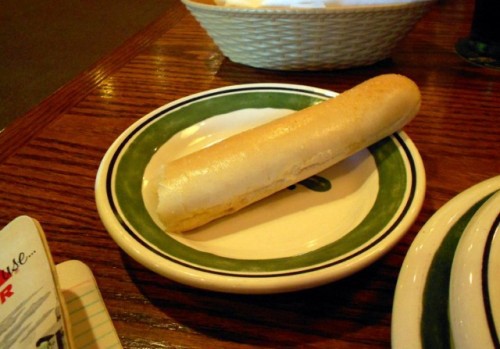
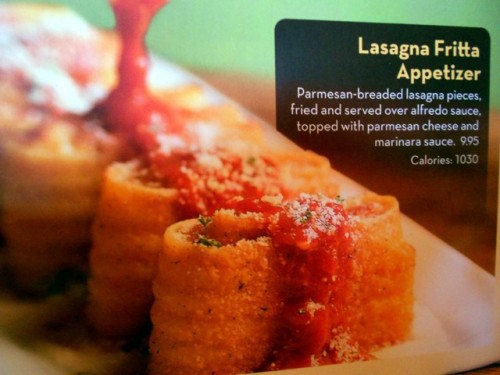
Maria: And these kids waiting tables, I got the feeling were fine kids but they weren’t allowed to be just regular and nice, they had to do their shtick. It’s Wallace’s Professional Smile thing x 100.
David: At any point did they describe a special to you and then present it as an opt-out? Like “And the Umbrian shrimp-n-cheese appetizer is really good, it’s fried shrimp inside fried cheese. How many can I put you down for?”
Maria: An assumption close? No, the guy was suspicious because I was taking photos of everything. But wait, yes, he kind of halfheartedly mentioned some vat of cheese or other.
David: FONDUTA. He wanted to serve you a bowl of various melted cheeses. It would be his pleasure to serve you that bowl of melted cheeses.
Maria: Vat O’Cheese! With sofa bits for mopping.
David: That way you can get some pre-cheese in before you move on to your after-cheese.
Maria: They try to grate it all over everything. Flailing the grater over everything. The soup, the salad, your head.
David: That app opt-out happened to me at a TGI Friday’s recently and I was sort of taken aback. Just like, “No, that’s not the way it goes at all. I was consciously not sending you any messages suggesting that I wanted the Malibu Rum Slathered Shrimp Jammers you just described.”
Maria: Yelling with the grater, at every table. “Everybody up for cheese?” I wrote it down exactly because I was just, “NO you did not just say that.” I sense they must get home and just collapse in despair at all they’ve been saying. All the mounds of endless cheese they’ve been grating. It’s a hell of endless cheese-misery. Cheese Miz.
David: There’s some Bluetooth-y manager paying attention, noticing if they do not flog the Fonduta and issuing demerits, because Fonduta was mentioned on some conference call as that sector’s AOE (Appeteaser Of Emphasis) for the week.
David: That’s the thing that bums me out about it most: the way it takes something fun — which is eating food, and also food with cheese melted on it — and routinizes it. Turns the dishes into units and the diners into “guests” or whatever the term of art is, and then it’s just outputs and inputs and extreme dairy promiscuity.
Maria: Pumps it up to giant melted consumption units of more and more fatness.
David: That commodification, and the inauthenticity that follows from denials of it, is honestly the thing that kills me about Papa John the most: him getting up in the camera, taking the tone that doctors use when giving you the results of a biopsy, and telling you JUST HOW MUCH HE CARES about giving you premium pepperoni.
David: And that is just so patently bullshit. Why must you insult me by acting as if you think I’d believe that, Papa John?
Maria: That is just the thing, it is insulting, and depressing, and behind it is this desire to hoodwink people out of excessive amounts of dollars. This is connected to not caring whether people are treated well generally, not caring what kind of lives they have. It’s all their problem.
David: Maybe that’s the thing that people dug about the review — all that falsehood and hype, Chef Luigi sniffing tomatoes at the imaginary cooking school and everyone laughing like they ate a handful of psilocybin over bowls of flaccid ziti. And then this old lady walks in there and is like “I had the water. It was good. The food was kind of whatever. The planters were nice.” That is actually what the experience is probably like. An actual opinion on Olive Garden from someone ostensibly in Olive Garden’s target audience, but clearly too polite to mention how profoundly it sucks.
Maria: Olive Garden’s target audience is anyone with a digestive system and a Visa card.
Maria: Still, though, the food and decor filled me with sadness because I hate the corpocracy and the low standards it tries to impose on all of us, because we deserve better.
David: What do you think it was that made everyone get so fired up about the review?
Maria: People not being sure what to think. Should I feel all warm and innocent inside on account of her charming rusticity, or should I be mocking this elderly rural journalist? People were becoming so furious in the comments sections, thinking they saw condescension or contempt when I think it wasn’t even there.
Maria: But this is exactly what I want to know. I don’t even quite understand why I was so enchanted myself, except that it seemed to lift the veil on something that is ordinarily veiled.
Maria: Sort of revealing the dream we’re all in. The strange water we’re swimming in.
David: This is indeed water. During the summer it might be raspberry lemonade.
Maria: And suddenly, Marilyn reveals the whole thing just by saying, “There are seats for those who are waiting.”
David: Oh that is kind of great out of context, isn’t it?
Maria: T.S. Eliot could not have made a better job of it. Nor Horse_ebooks.
David: There is melted fonduta nightmare sauce for those who are waiting. Plenty of room. Don’t say you weren’t very subtly warned.
Maria Bustillos is the author of Dorkismo and Act Like a Gentleman, Think Like a Woman.
David Roth writes “The Mercy Rule” column at Vice, co-writes the Wall Street Journal’s Daily Fix,, and is one of the founders of The Classical. He also has his own little website. And he tweets inanities!
Photo of Marilyn Hagerty courtesy of the AP.
